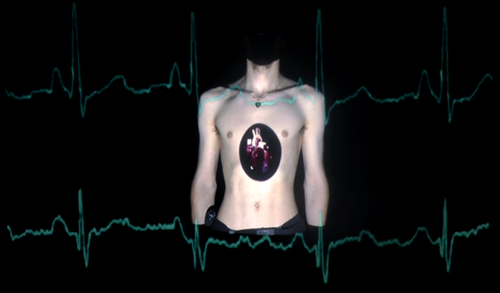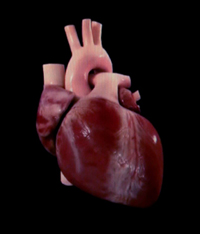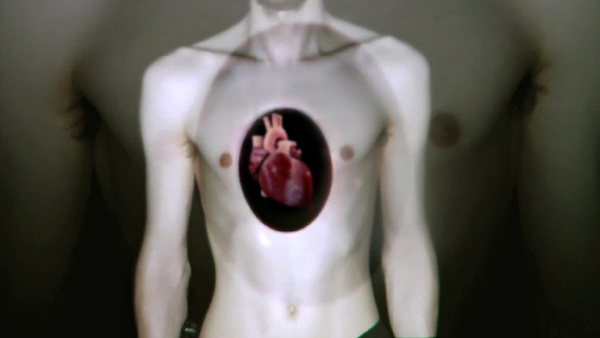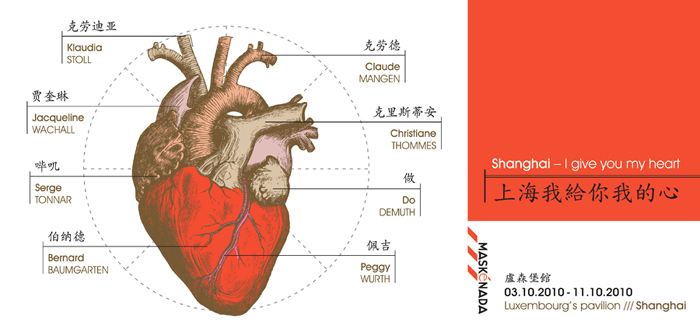 |
 |
 |
 |
 |
| |
|
|
|
| |
 |
| For german version |
|
 |
 |
EXPO 2010
|
|
 |
|
| |
|
"SHANGHAI - I give you my heart"
04.10. to 13.10.2010 at the Luxembourg Pavilion, Shanghai
The project "SHANGHAI – I give you my heart" approaches the subject of
human organ donation by means of dance, music, theatre and installation.
Crew :
Choreography : Bernard BAUMGARTEN
Director : Claude MANGEN
Video art : STOLL & WACHALL
Stage set : Do DEMUTH
Sound Design : Serge TONNAR
Production Assistent : Christiane THOMMES |
|
| |
|
 |
|
| |
|
" We, as citizens of Europe, don’t have the right to lecture the Chinese population,
but what we can do is to take up a position. A position which doesn’t intend to tutor
but only wants to describe who we are and how we live."
Interview Francois VALENTINY – LW 30.04.2009 |
|
| |
|
 |
|
| |
|
The world is not fair: Wealth and prosperity are spread unequally. Nothing has such dramatic consequences as the trade with human organs. The rich buy from the poor – anywhere on the planet.
The practice saves lives and brings suffering at the same time.
The western transplantation tourists can select the specialized hospital of their choice from all over the world. This results from the fact that traders in the ghastly organ dealing market offer low prices. You can already find a kidney going for the cheap price of 55.000€, a lung costs about 130.000€. These prices include everything from the organ itself over to the surgeon, the hospital stay, an interpreter etc. Only a small part of the money is acutally paid to the donor, in exchange for the suffering and substantial damage to his or her health.
Like anywhere else the mass beats down the price.
Hospitals and their countries compete with each other for wealthy Western patients. As a result, organ donors enter into competition, putting prices under pressure.
Society and the media choose to ignore this inhuman commerce – or play it down where it cannot be ignored. At the interface of ethics, philosophy, religion and medicine "SHANGHAI – I give you my heart" wants to contribute to a discussion that is slowly developing.
__________________________________________________
|
|
| |
|
The project „SHANGHAI – I give you my heart" tries to artistically convert the very sensitive topic of Organ donation throughout the aid of dance, music, theatre and installations. Similar to the "cellular memory" of a donated organ that conquers the body of the receiver, we will conquer the Luxembourg Pavilion in Shanghai and reshape it into a transplantation laboratory / installation.
Donating organs saves life’s! Which medical requirements have to be met to transplant an organ? Under which circumstances is the harvesting of organs ethically tolerable? How do the donor and recipient perceive the transplants? Is it immoral to commercialise the trade with organs? These questions and some other aspects concerning the sensitive Organ Donation topic, like for example the very much discussed thesis of organs having a "cellular memory", will be treated by the SHANGHAI : I give you my Heart. project.
Will the characteristics, preferences, dislikes, behaviour patterns or even specific knowledge of the donor be transmitted to the recipient? If so, how can we explain these transmissions? How does a donated organ change the identity of the recipient?
Organ transplants agitate the human self-conception as the perception of the own body and of death will be changed. How do relatives of organ donors and recipients perceive this and which significance applies to their own vision of a "meaningful death" and the "gift of life"?
The rapid development in the medical-technical field allow a contact to the human and his body that has nothing in common anymore with the traditional social concept. The "natural", meaning the taken for granted systems of life are questioned: What is death, what is life, what is nature or culture, natural or artificial? The blurring of these boundaries causes a lot of discomfort in public discussions and the bewilderment about medical feasibilities keeps growing.
How do the affected people live and experience this shift of borders between life and death? Does the official propaganda about new medical achievements, like „gifting a life" and therefore giving a meaning to death through organ donation correspond with their experiences.
Which ethical controversy do scientific disciplines like Ethics & Philosophy, Religion & Theology or Medecine carry out? This subject requires a personal discussion and opinion as well as a reflection about one’s own death or death in general. |
|
| |
|
 |
|
| |
|
| |
|
| |
|
|
|
|
|
| |
|
|
|
| |
|
|
|
|
 |